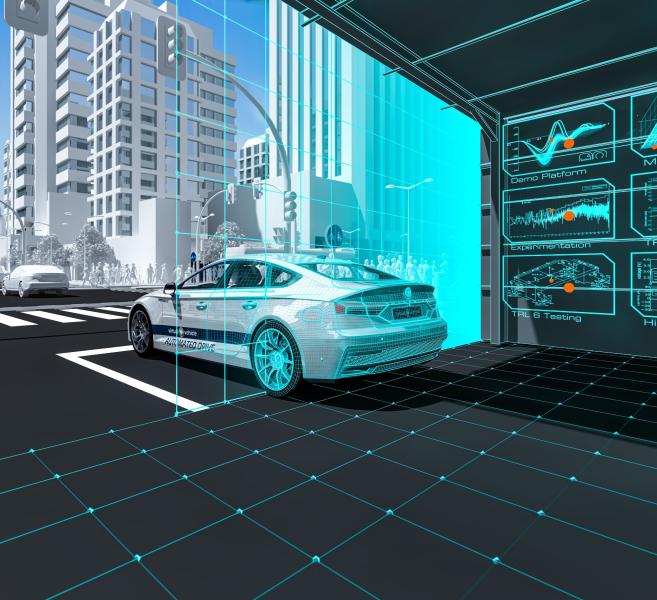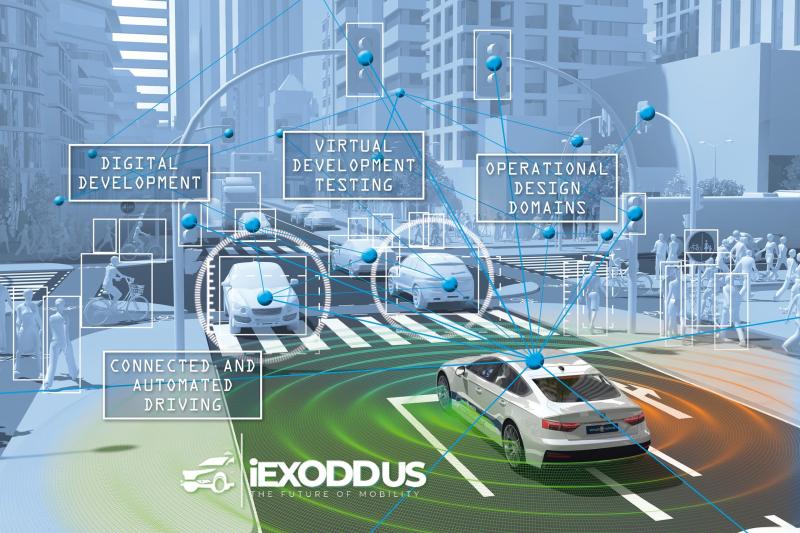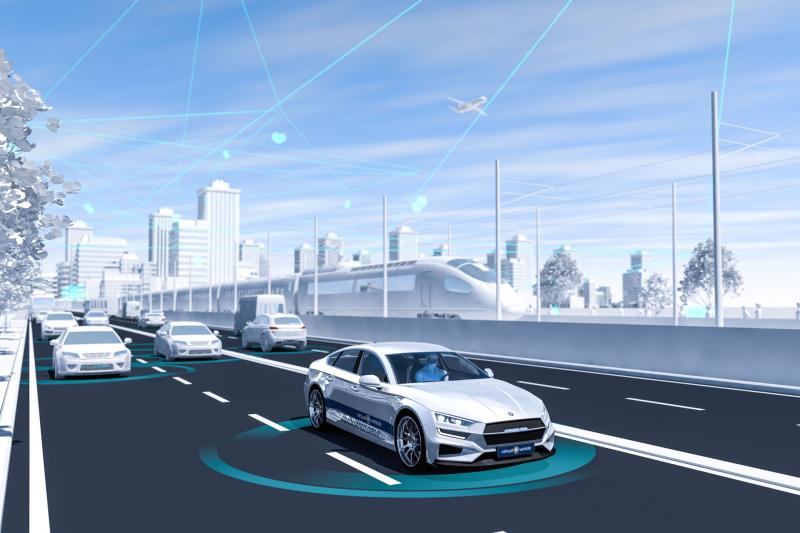Thursday, January 23, 2025 · 1040 words · 7806 characters
iEXODDUS drives innovation in CCAM technologies
As the automotive industry moves towards a future of self-driving vehicles, the iEXODDUS project aims to address current limitations and push the boundaries of what autonomous vehicles can achieve.
Coordinated by Virtual Vehicle Research GmbH, the EU-funded project focuses on advancing autonomous vehicle technology and expanding the capabilities of Operational Design Domains (ODDs) for automated driving systems, enhancing autonomous vehicle performance in complex scenarios such as roadworks and tunnels, improving traffic safety, and reducing environmental impact.
Graz (Austria), 23.01.2025 – The rapid advancement of autonomous vehicle technology promises enhanced efficiency and safety in transportation. However, operational constraints within Operational Design Domains (ODDs), including issues in sensing, behaviour prediction, and reliability, limit the potential of automated vehicles.
iEXODDUS improves connected and automated mobility
An ODD is fundamental for the safety of connected and automated mobility (CCAM). It describes the specific operating conditions under which CCAM can be used safely. Expanding the ODD framework is critical to enable these vehicles to navigate challenging scenarios such as construction zones, unmarked roads, and adverse weather conditions. This expansion involves robust perception and decision-making algorithms, reducing the need for human intervention and facilitating integration with human-driven vehicles.
While the benefits are substantial, challenges such as data collection, sensor technology, and regulatory frameworks must be addressed through interdisciplinary collaboration. iEXODDUS combines the expertise of 14 research partners to address these challenges.
“The iEXODDUS project is at the forefront of advancing digital technologies and navigation services, aligning with goals for increased safety, security, and sustainability in the mobility sector, ultimately paving the way for safer and more reliable automated transportation.”
iEXODDUS drives innovation in CCAM technologies
iEXODDUS meticulously assesses existing ODDs to unveil limitations and areas for improvement, fostering a deep understanding of ODD challenges and opportunities. This analysis serves as the foundation for a framework to assess and categorize ODDs across diverse automated driving scenarios. A key focus area is the enhancement of sensor technologies and perception capabilities through cutting-edge data fusion methods, expanding ODDs beyond current limits while considering environmental factors such as weather conditions and road infrastructure.
iEXODDUS envisions autonomous vehicles travelling across Europe, resolving harmonization and legal issues, and making policy recommendations. Collaboration with industry stakeholders and aiming for real-world demonstrations will enable an industry-tailored approach towards automated driving systems with extended ODDs.
„The iEXODDUS project will make a major contribution to autonomous mobility on highways throughout Europe by closing current operational gaps and mastering driving from level 3 even in previously difficult conditions such as roadworks or tunnels. We at THI are very pleased to support this project with our broad expertise in the field of artificial intelligence and vehicle safety.“
Key Benefits of the iEXODDUS project
- Extended ODD and Seamless Automated Mobility: Enhances autonomous vehicle performance in complex scenarios such as road works, tunnels, and incident zones, reducing human intervention and errors.
- Improved Traffic Safety and Flow: Reduces accidents and enhances road safety through better perception, decision-making, and smoother traffic flow, minimizing congestion.
- Environmental Impact: Lowers emissions and fuel consumption by optimizing traffic management and enabling eco-driving.
- Digital Twins and Infrastructure Support: Uses digital twins for real-time data integration, improving traffic management and helping infrastructure operators manage safer and more efficient roadwork zones.
- Standardization and Interoperability: Contributes to the development of standardized, interoperable CCAM technologies, supporting the broader European transport ecosystem.
About iEXODDUS
iEXODDUS – “Infrastructure for the Extension of ODDs – applied in connected and aUtomated driving and Standardization procedures” is a project funded under the Horizon Europe - Work Programme 2023-2025 for Climate, Energy and Mobility / HORIZON-CL5-2023-D6-01-03: Infrastructure-enabled solutions for improving the continuity or extension of Operational Design Domains (ODDs) (CCAM Partnership)
The project involves a consortium of 14 partners from 6 European countries with an overall budget of ~6 Mio. € and a duration of 36 months. As coordinator, VIRTUAL VEHICLE manages the project and leads efforts in perception systems, GNSS-denied navigation, pilot site integration, and dissemination. By advancing its expertise in virtual testing and autonomous driving, VIRTUAL VEHICLE aims to strengthen its portfolio, contribute to safer transport systems, and drive innovation in CCAM technologies.
About VIRTUAL VEHICLE
Virtual Vehicle Research GmbH, with 300 employees, is Europe's largest research center for virtual vehicle development. The research focus is on the close integration of numerical simulations and hardware testing in the automotive and rail industries. This approach facilitates the design and automation of testing and validation processes at a defined quality level, enabling the continuous development and validation of complex hardware-software systems. The emphasis on industry-oriented research makes VIRTUAL VEHICLE an innovation catalyst for the vehicle technologies of the future. VIRTUAL VEHICLE cooperates nationally and internationally with over 180 industry partners (OEMs, Tier-1 and Tier-2 suppliers, as well as software providers) and with more than 80 scientific partners
Contact & Information:
Virtual Vehicle Research GmbH
Wolfgang Wachmann
Marketing & Communications
Tel: +43 316 873 9005
Email:
iEXODDUS
Selim Solmaz
Head of Control Systems Group, VIRTUAL VEHICLE
Email:
About Institute for Automotive Engineering (ika) der RWTH Aachen University
As part of RWTH Aachen University, the Institute for Automotive Engineering (ika) researches the entire vehicle, including its systems and their interactions. From the initial idea through innovative component and system concepts to vehicle prototypes, the Institute's employees are shaping the vehicle of the future. The ika makes a recognized contribution to solving current and future challenges both in public projects and in cooperation with automobile manufacturers and suppliers.
The basis of our intensive research work for large parts of the automotive industry as well as public funding bodies at EU, federal and state level is our extensive infrastructure, which ranges from drive, battery, chassis and tire test benches to acoustic, thermodynamic and servo-hydraulic test facilities to a complete vehicle crash facility and test tracks including state-of-the-art measurement technology. In addition, there is up-to-date software and hardware equipment for all necessary simulation disciplines. ika employs about 120 permanent staff and more than 80 student assistants. In addition, around 100 student research and development projects are carried out on a permanent basis.
Released for publication. In case of reprinting, please send us a copy. If you have any questions or would like to receive further material, please contact your contact person.
Press contact
Institute for Automotive Engineering (ika), RWTH Aachen University
Steinbachstr. 7
52074 Aachen
Germany
Nikola Druce M.A.
Head of PR/Media
+49 241 80-25668
Contact
Amarin Vincent Klöker M.Sc.
+49 241 80-25589
Email
Images
and 1 more picture
Download
Download PDF of press release.
Download press release with images as zip file.
Link
Service
Cooperations
Address
Institute for Automotive Engineering
RWTH Aachen University
Steinbachstraße 7
52074 Aachen · Germany


![[Logo: Institute for Automotive Engineering (ika)]](https://ika.rwth-aachen.de/images/ika-logo-a-blau-blau-rgb.svg)


